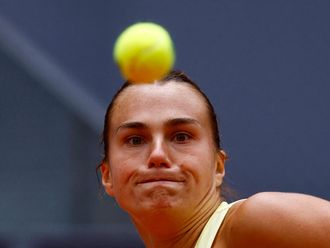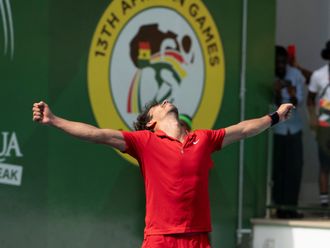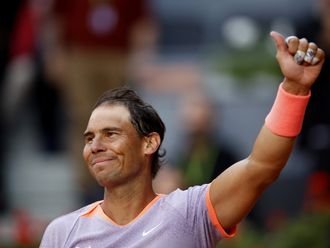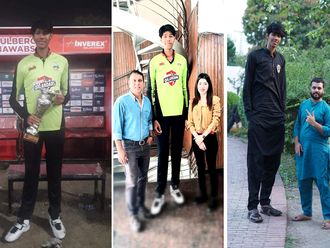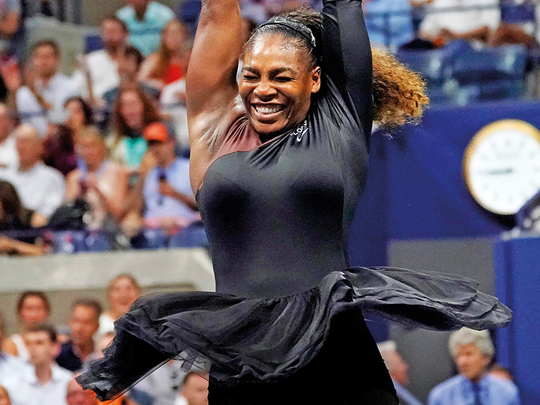
New York: Serena Williams has played in many a showplace during her 23 years as a tennis pro, but there can be no other court on the planet that stirs up a mother lode of memories like Arthur Ashe Stadium.
It is the cacophonous spot where she became the first Williams sister to secure a major singles title, winning the US Open in 1999. It is where she would prevail five more times, in 2002, 2008, 2012, 2013 and 2014.
The court has changed colour through the years — from green to blue — and added a roof along the way. But this is still the same place where Williams melted down against Kim Clijsters in the 2009 semi-finals, threatening a line judge, and where she tightened up and failed to complete the true Grand Slam in 2015 by losing to the unseeded Italian Roberta Vinci in the semi-finals.
What has happened in Ashe, the shorthand the players use, has defined her and redefined her as a tennis champion, but unlike so many great players of her generation, she is still coming back for more.
And on Tuesday night, with a crowd of 23,771 providing consistent support, she powered her way back into the US Open semi-finals with a 6-4, 6-3 victory over No. 8 seed Karolina Pliskova.
“I think Serena remembers the scars here,” said Chanda Rubin, the former top-10 player from the United States who is now an analyst. “I am sure that loss in 2015 sticks with her, but I think the positives are that she’s finding a way to work through the tough moments. You can still see some of the nerves. She wants this badly, and it’s going to be a challenge to maintain a balance for her and a positive state of mind where she can play the kind of tennis she played at the end of this match and earlier in this tournament. But I think she’s getting better and better.”
At age 36, Williams has also edged closer and closer to tying Margaret Court’s record of 24 Grand Slam singles titles. This is Williams’ third major tournament since returning to the circuit in March after giving birth to her daughter, and she fell just one win short of the record at Wimbledon in July, losing to Angelique Kerber in straight sets in a final where Williams struggled to manage the moment emotionally.
But Kerber was already a two-time major champion and former No. 1.
No one remaining in this US. Open women’s tournament has a similar resume. Williams’ opponent in the semi-finals Thursday will be Anastasija Sevastova, a 28-year-old Latvian who had previously never advanced this far at a Grand Slam.
Sevastova deployed her guile and counterpunching skills to ambush Sloane Stephens, the defending champion, 6-2, 6-3, earlier Tuesday. The sun-baked, humid conditions in Ashe Stadium left the normally self-contained Stephens uttering oaths as well as spraying groundstrokes.
In the other half of the draw, where the quarter finals will be played Wednesday, the two highest ranked players remaining, No. 14 Madison Keys and No. 19 Naomi Osaka, have huge baseline power and formidable first serves but have yet to prove they have the consistency and mentality required to win a major.
“Serena’s the favourite, oh, she’s the favourite,” said Rennae Stubbs, who is working as a coaching consulting with Pliskova and will soon begin coaching her more formally “This is the best tennis I’ve seen her play since she came back. She’s moving better, and her timing on the ball is fantastic. It’s all about, like at Wimbledon, how can she control her nerves right toward the very end? It will mean so much to her. So it’s emotionally a question if she can handle the anxiety.”
For Serena, it was her first victory over a top-10 player since her return to the circuit.
“Shocking,” Williams said. “My first top-10 win. I really felt like I was playing well in Cincinnati, even though I lost. I was just on the verge. If I could have had just one more match before I played a top 10 player, I think I would have done better. I’m getting those matches now. Just was so light on the matches.
“So now I feel like I’m at a level where I can play and try to compete against these amazing women in the top 10.”
On the men’s side of the draw, Dominic Thiem said his epic defeat to close friend Rafael Nadal in the US Open quarter-finals will “stay with me forever”.
Defending champion Nadal downed battling ninth seed Thiem 0-6, 6-4, 7-5, 6-7, 7-6 to reach the semi-finals for the seventh time.
In a gripping 4-hour 49-minute contest, which concluded at 2.04am on Wednesday, world No. 1 Nadal won through to keep his bid for a fourth title in New York and 18th Grand Slam crown on track.
“It’s going to be stuck in my mind forever. Forever I’m going to remember this match, for sure,” said Thiem after his first ever hard court match against Nadal.
“Tennis is cruel sometimes because I think this match didn’t really deserve a loser. But there has to be one.
“It ended up in the fifth set tiebreaker, there it’s 50/50. He made one more point than me.”
Thiem handed Nadal, against whom he lost in the Roland Garros final in June, just his fourth ever ‘bagel’ set at the Slams.
That was wrapped up in just 24 minutes with Nadal winning only seven points.
Thiem was also 5-3 ahead in the third set and 4-2 in the fourth before he was reeled in by Nadal, the three-time champion in New York.
Nadal said he had told Thiem he was sorry for the result although the Austrian laughed off that consolation from his close friend.
“I don’t think he’s really sorry,” said the 25-year-old.
“I mean, he’s a great guy. I don’t want to lose against anybody. But now I wish him the title the most, that’s for sure.
“I think we almost all the time have great matches. I hope that we have many more in the future — with a different end.”
The semi-final will pit Nadal against third seed and 2009 US Open champion Juan Martin del Potro for the second successive Grand Slam tournament.
At Wimbledon, Nadal came back from two sets to one down to win in five in a quarter-final which stretched to almost five hours.
— New York Times, with agencies


